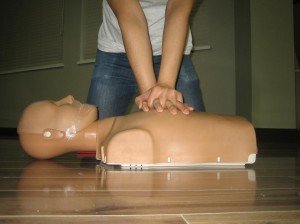
Each year, half a million and more Americans die because of heart disease. Coronary artery disease alone is responsibile for two-thirds of that, killing more than 300,000 men and women annually. In 2009, more than half of those deaths were men. Though these statistics have gotten better in the past 12 years, heart disease still remains a big problem.
What does CPR have to do with heart disease?
One of the most dangerous things that can happen if you have a heart condition, whether lifestyle-related or otherwise, is a heart attack. A heart attack (medical term: myocardial infarction) happen when the blood flow to a part of (or the entire) heart is cut off. Without oxygen, the heart can go into cardiac arrest – a condition where the heart stops beating completely. This is very dangerous because there is no blood circulating through the body if the heart is not beating.
Cardiopulmonary resuscitation is used during cardiac arrest, to restore the spontaneous beating of the heart. CPR has three main parts: compression, ventilation, and defibrillation. When you study advanced CPR, you will learn about other medical management techniques, such as medication administration, used adjunct with CPR.
Studying CPR: basic and advanced classes

Our location in Las Vegas (Las Vegas CPR) categorizes training into basic and advanced classes. For the general public and health care providers, there are three basic courses to choose from. Health care professionals have the option of both advanced courses. Basic courses will focus on Basic Life Support – the three core skills. Advanced courses will focus on Advanced Life Support – medical management.
Basic Life Support classes
- Basic CPR (Heartsaver) – class for the general public, runs for 4 hours
- Basic CPR (Heartsaver C) – class for health care providers, runs for 4.5 hours
- Basic Life Support for Health Care Providers – class on one and two-rescuer CPR for HCPs, runs for 4.5 hours; re-certification runs for 4 hours
Advanced Life Support classes
- Advanced Cardiac Life Support – class for health care professionals about the medical management of cardiac arrest in adults, runs for 16 hours; re-certification runs for 6 hours
- Pediatric Advanced Life Support – class for health care professionals with the same structure as ACLS but focuses on pediatric victims (infants and toddlers), runs for 14 hours; re-certification runs between 6 and 8 hours.
CPR credentials
All of our courses at Las Vegas CPR are credentialing classes. We award students with CPR credentials that are valid for 24 months before they have to be renewed. Re-certification classes are available for three of our programs, one BLS and two ALS courses. We remind all our students to sign up for re-certification classes before the expiration date, because we do not renew expired credentials (you would have to retake the program again).
